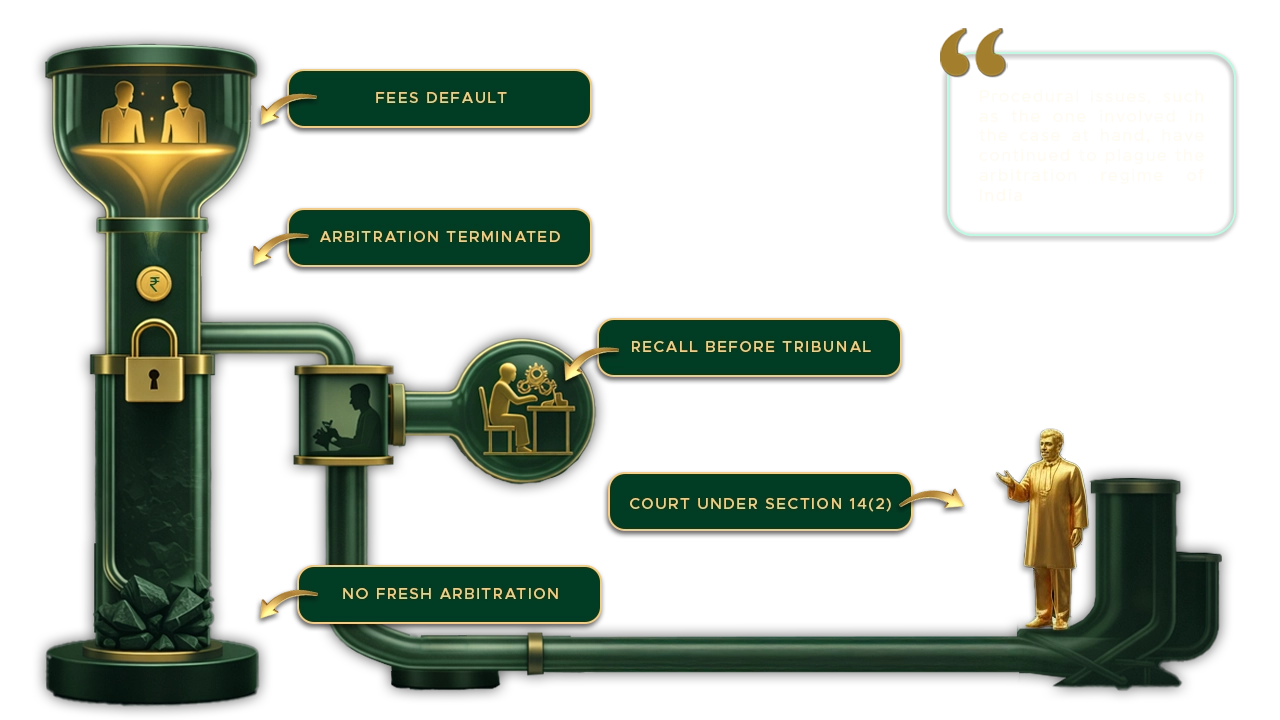Introduction
The intricate tapestry of insolvency law, woven with the threads of creditor rights and the collective objective of resolution, presents a constant challenge of interpretation and application. One such critical knot lies at the intersection of a pre-existing contractual right to set-off and the statutory moratorium imposed by Section 14 of the Insolvency and Bankruptcy Code, 2016 (IBC). This tension was at the heart of a recent application1 filed before the National Company Law Tribunal (NCLT), New Delhi Bench.
The Hon’ble Bench, comprising Shri Bachu Venkat Balaram Das (Member Judicial) and Shri Atul Chaturvedi (Member Technical), navigated this complex legal landscape with a nuanced and well-reasoned judgment. They held that the right to set-off, when arising from transactions entered into prior to the commencement of the CIRP, is not extinguished by the moratorium. The Tribunal’s decision, therefore, is a powerful reminder that Section 14, while a potent tool for preserving the corporate debtor’s value, does not operate in a vacuum. It must be read in a manner that respects pre-existing legal rights and commercial realities.
The factual matrix was a familiar one: a corporate debtor, a creditor with a claim, and the commencement of the Corporate Insolvency Resolution Process (CIRP). However, the narrative diverged with the respondent—the Resolution Professional—permitting a set-off of transactions based on an arbitral award, an action vehemently challenged by the applicant. The applicant’s position was a testament to a strict interpretation of the IBC. They argued that the moratorium under Section 14 is a fortress, designed to protect the corporate debtor’s assets from any form of diminution, and that a set-off, by its very nature, reduces the pool of assets available to the collective body of creditors. Allowing such a transaction, they contended, was not merely an administrative error but a fundamental violation of the Code’s principles, warranting a reversal of the set-off and disciplinary action against the Resolution Professional.
The NCLT, seized of the matter, was presented with a choice: to uphold the sanctity of the moratorium as an absolute bar or to recognize the inherent legal principle of set-off as a pre-existing right. This article will delve into the jurisprudence upon which the Court relied to pass this judgment on this controversy, examining the legal rationale and precedents that informed the Tribunal’s interpretation of Section 14 and its application to the principle of set-off.
The legal landscape governing this area is quite clear. It is a settled law that once a moratorium under Section 14 of the IBC is in place, the enforcement or recovery of any pre-existing obligations against the corporate debtor is strictly prohibited. This principle, which protects the corporate debtor’s assets, has been consistently affirmed by higher courts. In Gujarat Urja Vikas Nigam Ltd. v. Amit Gupta2, the Supreme Court clarified that a contractual obligation remains enforceable until the moratorium kicks in, after which all proceedings against the debtor are restricted. Similarly, the National Company Law Appellate Tribunal (NCLAT) in Sunil Gutte v. Avil Menezes & Ors3., emphasized that the crucial date for enforceability is the date of actual encashment or realization, not the date the contract was made. So, how could the RP’s actions in this case be justified?
The Exception that Proves the Rule
The key to this puzzle lies in a landmark judgment from the Supreme Court: Bharti Airtel vs. Vijaykumar V. Iyer & Ors4. This case, as the tribunal so eloquently detailed, carved out a critical exception to the moratorium’s seemingly absolute bar on set-offs. The Supreme Court distinguished between different types of set-offs, namely statutory and insolvency set-offs, which are generally not applicable during a CIRP, and a contractual set-off. The first exception, where a right to set-off exists based on a contract predating the CIRP, is a simple matter of respecting pre-existing agreements.
The second exception, which became the lynchpin of the present case, is what the Supreme Court termed a ‘transactional set-off’. This is a powerful concept. It applies when a claim and a counterclaim are so intrinsically linked by a series of transactions that it would be “manifestly unjust” to separate them. The tribunal stated that this kind of set-off is not an aggressive act of recovery but a defensive mechanism, a “defence to protect the legitimate expectation and respect legal certainty.” It does not contradict the moratorium because it treats the connected transactions as a single, indivisible whole.
Armed with this legal framework, the tribunal proceeded to analyze the RP’s actions. The applicant’s primary argument was that the set-off was “allowed” by the RP during the moratorium. The tribunal, however, dismissed this as an unfounded allegation, highlighting the distinction between allowing a new action and recognizing a pre-existing one. The RP, in this case, was not creating a new right but merely discharging an administrative duty to compile accounts based on transactions and an arbitral award that took place well before the CIRP commenced.
The tribunal’s conclusion was clear and definitive: the RP was not performing an illegal act but was, in fact, acting well within the legal parameters established by the Supreme Court in the Bharti Airtel case. The RP’s role was to preserve and protect the corporate debtor’s assets, and by recognizing a genuine, pre-existing transactional set-off, the RP was doing just that.
Finally, the tribunal addressed the applicant’s motivations. It was noted that a materially identical application had already been filed by an affiliated entity and dismissed. The tribunal firmly stated that the applicant was “precluded from re-agitating the same allegations and issues,” concluding that the application was a vexatious attempt to disrupt the CIRP.
Conclusion
In this decisive ruling, the Adjudicating Authority has not merely dismissed an application; it has solidified a critical distinction that will undoubtedly shape the future of Corporate Insolvency Resolution Processes. The judgment serves as a powerful validation of the Resolution Professional’s administrative duties, clarifying that their role in reconciling pre-existing accounts is not a breach of the moratorium. By expertly wielding the precedent set in Bharti Airtel vs. Vijaykumar V. Iyer, the tribunal has established that a “transactional set-off” is a legitimate defensive right, not a new act of recovery. This nuanced interpretation ensures that the protective shield of the moratorium is not misused to invalidate genuine, pre-CIRP financial arrangements, thereby upholding the principles of legal certainty and fairness that are essential for the effective functioning of the IBC. The decision effectively insulates RPs from baseless challenges, allowing them to perform their statutory duties with greater confidence and efficiency.
The ramifications of this judgment are significant for the insolvency ecosystem. It provides a much-needed legal precedent that could streamline the CIRP by deterring frivolous litigation aimed at stalling the resolution process. For creditors, it clarifies that a legitimate right to a transactional set-off, even if formalized during the moratorium, remains enforceable. This encourages transparency and expedites the consolidation of financial records, which is a cornerstone of a successful resolution plan. By rebuffing the applicant’s attempt to re-litigate a previously dismissed matter, the tribunal has also sent a clear message that the spirit of the IBC—focused on timely and efficient resolution—will not be held hostage by procedural delays and vexatious applications.
While the judgment provides valuable clarity, it also opens the door to future questions. The entire rationale rests on the premise that the transactions were “closely connected” and the set-off was “genuine.” But what happens in cases where the link between the transactions is less apparent, or where the set-off itself is based on a highly contentious and disputed claim? The Adjudicating Authority’s ruling here may have settled the matter for this specific set of facts, but it lays a fertile ground for future legal disputes over the precise boundaries and evidential requirements of a “transactional set-off.”
Citations
- Vistra ITCL (India) Limited Ansal Urban Condominium Private Limited IA-118/2024 In (IB)-113(ND)/2021
- Gujarat Urja Vikas Nigam Ltd. v. Amit Gupta AIRONLINE 2021 SC 123
- Sunil Gutte v. Avil Menezes & Ors.Company Appeal (AT) (Insolvency) No. 515 of 2025
- Bharti Airtel vs. Vijaykumar V. Iyer & Ors.Civil Appeal No. 3088 and 3089 of 2020
Expositor(s): Adv. Anuja Pandit






